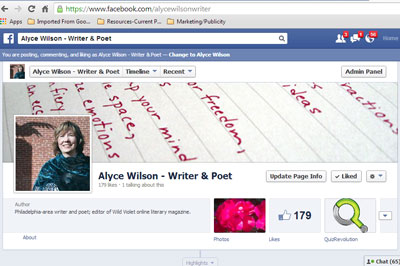How to Build an Author Platform in 30 Minutes a Day
Wednesday, October 16th, 2013
I tried Grammarly’s plagiarism checker free of charge because my cat thought I was ripping off his diction. Can has verb disagreement now?
Recently, an old friend, who’s a fiction author, asked for advice on how to build up his name as an author in advance of sending a fiction collection around to publishers. On a related note, I received a Facebook message from a Philadelphia-area author, asking a similar question. In the writing business, we call that building your author’s platform: in other words, building up a network of potential readers, as well as building up a sense of who you are as an author.
While I have a lot of potential growing yet to do, I’ve been actively working on building my author’s platform for a couple years now. As regular readers know, I am also a work-at-home mom, which means I have to work my writing and career-building efforts into a day already packed with child care and housework. If you follow the advice in this post, you can begin building an author’s platform in 30 minutes or less a day.
�
Planning App
Reminders can keep you on schedule. I know I find them invaluable. I use GTasks (Google Tasks), primarily through the app on my Droid phone. It has a simple, no-fuss interface and allows you to schedule recurring tasks, such as “Post blog entry” for every Wednesday.
�
Author’s Photo
 Take or have someone take a decent photo of you to use for your author’s sites. Rather than just taking an Instagram selfie, opt for a camera with a timer that you can use to take a variety of shots. The best author’s photos both look professional and show something of your character. I participated in a photo shoot for a friend at Edgar Allan Poe’s Philadelphia residence. She needed to work on portraits for her photography class, and one of my favorite recent photos shows me with the statue of a raven in the background. I’m going to be seeking another photographer friend’s help soon, since I’ve lost 20 pounds since that photo was taken.
Take or have someone take a decent photo of you to use for your author’s sites. Rather than just taking an Instagram selfie, opt for a camera with a timer that you can use to take a variety of shots. The best author’s photos both look professional and show something of your character. I participated in a photo shoot for a friend at Edgar Allan Poe’s Philadelphia residence. She needed to work on portraits for her photography class, and one of my favorite recent photos shows me with the statue of a raven in the background. I’m going to be seeking another photographer friend’s help soon, since I’ve lost 20 pounds since that photo was taken.
Author’s Site
If you don’t already have an author’s site, your first task should be to create one.
Remember: a Facebook page is NOT a substitute for your own author’s site, in part because its functionality is limited and always subject to change. At minimum, an author’s site should include: a bio page that includes highlights about your writing career and relevant tidbits about you, including a contact email (you should designate one e-mail for writing correspondence, ideally one you can access readily when you’re on the move, such as with a smart phone). You can also include a page with links to your online writings and/or samples or your work (although it’s fallen out of favor to include a complete resume, for security concerns). If you have any published books for sale, include links to them.
Nowadays, it’s also important to include a blog or bulletin board, which you can update at least once a week with thoughts on your writing, personal observations, or links to interesting articles. Keep in mind that anything you post will help to form your public persona, so try to refrain from such impulsive posts as complaining about a specific reviewer, for example.
One of the best places to start an author’s site is on WordPress, which offers free hosting if you don’t already have a hosting company. You can also sign up to get your own domain (which should be either your professional name or something that connects to your writing style or genre). To do this costs only $13 a year.
I use WordPress for this blog as well as for my BelatedMommy blog and online literary magazine, Wild Violet. In addition to the large variety of templates, which allow for almost any format, I love the ability to schedule posts in advance and to incorporate plug-ins to allow readers to share posts easily or subscribe to the blog.
WordPress is the best choice for people who have some familiarity already with creating web pages and blogging. For those with fewer Web skills, check out Wix.com or Biz.nf to create a professional-looking free website. While I haven’t tried their website creator, I would also point you toward Bravesites by Bravenet.com, which offers free websites created through templates. I’ve used Bravenet’s free mailing list manager for Wild Violet for many years and have had nothing but good experiences.
Setting up your author’s site may take several days, if you stick to the 30 minutes a day goal. However, once it’s set up, you can schedule one weekly update (preferably on a weekday) that will take you 30 minutes or less to write.
�
Social Networking
So many social networking sites exist that it can be decide where you want to spend your time. Which ones should you utilize, and how can you avoid becoming overwhelmed?
A Facebook page is a good idea, simply because so many people are currently on Facebook, so it can be a good way to reach people like college buddies, family members, and new fans all at once. The process of creating a page is fairly simple; just read Facebook’s guide to creating a business page. Once it’s created, remember to post something at least a week. I primarily include links to my online articles and writings, but it’s also a good idea to post polls or other interactive posts. Facebook gives your posts higher priority on people’s feeds if they have interacted with you recently.
Twitter, with its microblogging — or instant update — platform, can be a valuable tool for connecting with writers, publishers, magazines, and others. For this reason, it’s worth joining. Read through Twitter’s Getting Started Guide for some tips. My advice: download an app like Tweetdeck, which makes it easy to schedule tweets in advance. Spend a few minutes in the morning scheduling tweets, keeping in mind that, just like conversations should be 50/50 listening and talking, you should retweet other users’ tweets or share links to articles and other web content at least as much as you share or promote your own work (and probably more). You ever have that blind date with someone who talked nonstop about him or herself without letting you have a word to talk about yourself? Don’t be that person! Some authors even schedule a whole week’s worth of tweets in advance, scheduling at least four tweets per day, including both links to interesting articles and promotions for their own work. I’d highly recommend following @Mashable immediately and reading their many articles about social networking and Twitter.
LinkedIn can be a good way to connect with other writers on a professional basis. You can do this by searching for LinkedIn groups that connect to your writing specialty. Make sure you read through the recent posts to see if a given group really connects with your interests. The best advice for this site, or for similar networking communities, is to spend 99 percent of your time interacting with people on a personal basis. Offer feedback on writing when asked; participate in conversations; pose writing-related questions. These connections will then be far more interested in your writing endeavors than they would be if you simply jumped into a conversation and shouted out, “I have a new book out!” That would be annoying at a social function, and it’s just as inappropriate here. Here’s a guide to how to use LinkedIn effectively. Stop in at least once a week to read and comment on the groups where you’re a member. You can also post links to your writing via your LinkedIn feed using apps such as “AddThis” plug-in, available for multiple browsers. I use it with the Google Chrome browser and love its easy functionality.
Other social networking sites that you might consider using include Tumblr, which is primarily a blogging/link sharing platform; Google Plus (Google+), which has become sort of the “anti-Facebook” and is therefore a way to connect with people who aren’t on Facebook; and Goodreads, which is a reader/writer site that allows you to list and promote your own books, as well as share reviews of other books and participate in communities. If you are maintaining a blog, either a personal blog or an author’s blog, seek out writing communities. Remember, though, that you’ll only get out of it what you put into it: you need to both post and comment on other people’s posts if you want them to remember you. This is why it’s best to schedule some time once a week to actively read and post on your preferred networking sites.
Don’t feel that you need to join all of these sites. Spend your time on the sites where you feel the most comfortable and build connections. You can always add more sites later if you want to broaden your reach.
�
Submit Your Writing
Of course, one of the best ways to build your author’s platform is through having your work published. If you want, you can buy a membership to the excellent writing markets produced by Writer’s Digest (Writer’s Market, Poet’s Market, Novelist and Short Story Writer’s Market, for example). Keep in mind: you can write that off as a business expense on your taxes (as you can any expense related to your writing career, such as web domains or the cost of postage for submissions).
For some free markets, visit: Poets and Writers, Duotrope, Ralan.com (SF), and WritersWrite, which are among the best comprehensive free guides. You may also want to join a free mailing list or two, such as offered at FundsForWriters.com and WritingForDollars.
You might also find it useful to put a short story or a handful of poems up on Smashwords as a free ebook, which could attract new readers.
�
Summary
Building your author’s platform takes time. My best advice: remember that it’s a gradual process and that whatever small steps you take can help you build more connections and introduce your to more potential readers. In order to keep from getting overwhelmed, set just one major task for yourself each day. After you’ve gotten your site/blog set up and have joined the social networking sites you wish to join, set a timer to spend 30 minutes or less on the site(s) where you’re focusing your energy that day.
Over time, you’ll be pleasantly surprised by how opportunities start to come your way, thanks to the foundation you’ve built.
This post was sponsored by Grammarly.com, the automated proofreader and personal grammar coach.
�
Category Business of Writing, Networking, Publicity / Tags: Tags: author's platform, blogging, social networking, /
Social Networks : Technorati, Stumble it!, Digg, delicious, Yahoo, reddit, Blogmarks, Google, Magnolia.






























